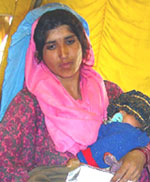Press release
Web Reports Highlight UN Population Fund's Fast Response to Afghan Women's Health Needs
22 April 2002While tens of thousands of Afghan refugees are returning home each week, many more remain in refugee camps in Pakistan, dependent on continued assistance from UN and non-governmental agencies. Reproductive health care for women, including assistance for safe childbirth and family planning services, is an urgent need. Afghanistan has one of the world's highest maternal mortality rates, 1,700 deaths per 100,000 births.

Extending reproductive health care to women without access to potentially lifesaving services is the top priority for the United Nations Population Fund (UNFPA), both in working with Afghan refugees and in assisting Afghanistan's reconstruction. At the request of the Afghanistan interim administration and in cooperation with sister UN agencies, the Fund is the lead agency for reproductive health, working with the Ministry of Public Health to make motherhood safer and voluntary family planning more widely available.
The Population Fund is also helping the Ministry of Women's Affairs to link women's education and reproductive health, and the Central Statistics Office to start collecting essential data on Afghanistan's population.
A UNFPA information team visited refugee camps in Pakistan's Khyber Agency in late March to report on Afghan refugees' pressing reproductive health needs and the Fund's effort to address them. The team also made two visits to Kabul in February and March. It has produced two short video documentaries and a series of news articles and photographs for the UNFPA web site.
Contact Information:
William A. Ryan
Tel.: +66 2 288 2446
Email: ryanw@unfpa.org